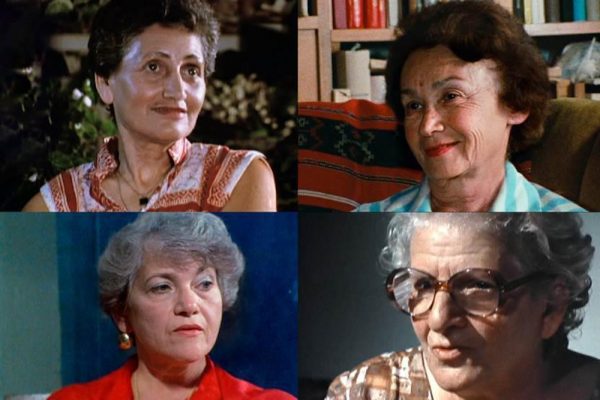Available on Blu-ray Mon 18 Feb 2019
Television loves tears. The tears of victims in news items, celebrities in meltdowns, and disgraced politicians all offer validation and spurious authenticity. Even crocodile tears are okay for TV.
There are remarkably few tears in Shoah: the Four Sisters. This is not director Lanzmann’s gruelling 1985 nine-hour production but selected unused Shoah material. Four women recount the horrendous and barbaric experiences they survived at the Nazi death camps. Is there anything more to be said by victims of the Holocaust? Well, frankly, yes there is.
With neo-Nazis and anti-Semitism on the rise again and human rights abuses from as far afield as Saudi Arabia and China, to the torture chambers of Kazakhstan and genocide in North Korea it’s timely to be reminded of the worst that humans are capable of.
These Shoah interviews are gripping testament to what happened. In one, The Hippocratic Oath, Ruth Elias, a fiercely intelligent woman, sits on a wicker chair surrounded by plants and tells her story. The cattle trucks, degradation, typhoid, starvation, rats, dehumanisation, and the inevitable feeling of guilt about surviving when all the rest of her family were murdered. At one point she is shipped away from the camp to Hamburg on a slave labour project clearing up a bombed refinery but when her pregnancy is discovered she is back in Auschwitz.
Only in her early 20’s when she gave birth in appalling squalor did she somehow summon the will to keep going. The newborn was swaddled in rags until she caught the eye of Dr Josef “Angel of Death” Mengele who wanted to discover how long a baby would survive without food. Finally Ruth was offered a syringe of morphine by a compassionate woman doctor which she was forced to use (as the doctor had sworn the Hippocratic Oath) to put the child out of its misery and save it from further indignity. It’s a story that’s told with (almost) dry-died candour.
Elias is a natural storyteller speaking in near-fluent English. She deals with Lanzmann’s tiresome interruptions with stunning matter-of-factness. “What was Mengele like?” he asks. Her response: “I’ll tell you later, okay?”
All this should be unwatchable, painful viewing but its simple frankness saves it. It’s impossible to imagine the hell of the Nazi death camps – it is beyond understanding – but this important film is a timely reminder for a world riven with dissent, discord and division. A reminder of the worst acts of humankind.
